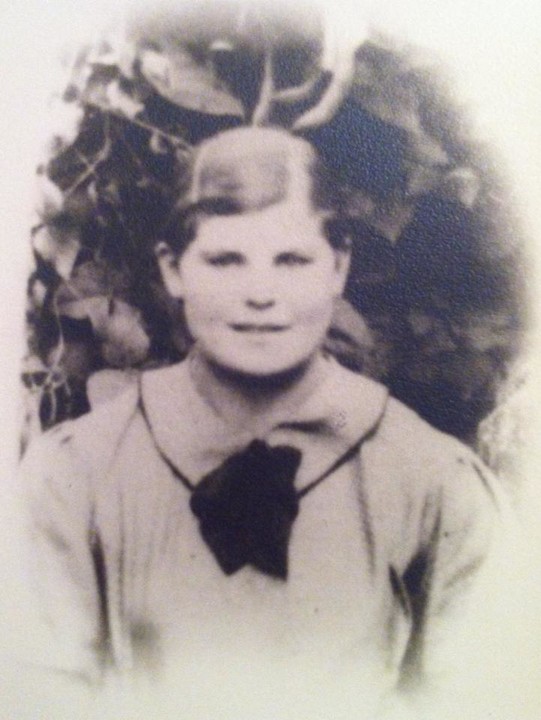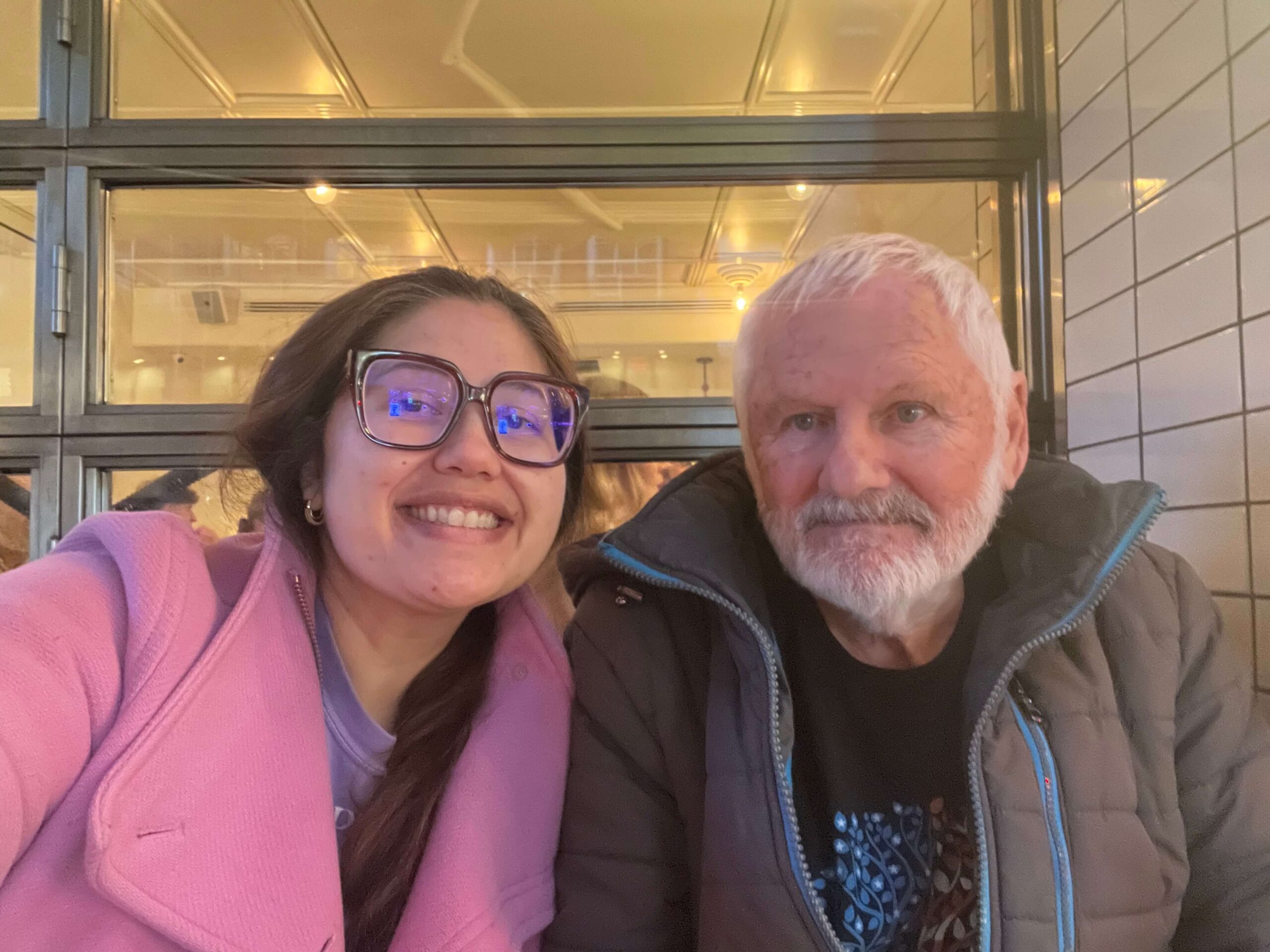
My grandpa passed away on March 9, 2014.
My grandpa, Agin, was a dairy farmer who was born in Eastern Europe, was taken to Germany, survived World War II, and started a life with my grandma and father in the United States. I knew that grandpa could not read or write in English. Whenever I spoke to him on the phone, he had an accent. He had lost a finger from a farming accident. That’s much of what I knew of him growing up, since I lived far away from him. I actually didn’t even know what country my grandparents were from. Sometimes, my papa said we were Russian, sometimes, we were Polish. During my childhood, the region they were from was the Soviet Union or USSR.
As a child, I wanted to be close with my grandma so I wrote her letters frequently as a child. I remember the excitement of opening up the mailbox and a letter from Tennessee was addressed to me, “Maya Rowencak” in my grandma’s handwriting. My grandma and I were penpals, and I kept every letter she sent me in a yellow and pink basket.
My grandma passed away a decade earlier than my grandpa. At her funeral, I recall that her neighbor came up to me and introduced herself. She said, “I read every letter you sent to your grandma.” I remember being shocked. She continued, “I also wrote you every letter because she could not read or write. She loved you so much. I feel like I know you. ” I had no idea grandma couldn’t read or write. My grandma never told me.
I recall one letter where she wrote:
“Some people have book sense, but no common sense. I have common sense.”
I never really understood what she meant by that as a kid because I was told that school was so important. But as I got older, I realized the wisdom of her words.
I thought I read all her letters, until I discovered one important letter.
I was at my grandpa’s funeral and was looking at photos displayed on a table. I discovered how my grandpa was the groundskeeper of an orphanage and was the disciplinarian of the orphan boys at St. Mary’s Orphanage in Nashville, Tennessee. For the first time, I saw the wedding photos of my grandparents. Because I was older, I treasured these old photos even more.
Then I found this one letter sitting on a table. It was several pages typed in a courier font. It was written by my grandma.
So I decided to share her story, so that my grandma’s letter could be read by others.
“My name is Katherine Rowencak and I am from Ukraine (now Poland) and in 1939 when I was sixteen years old the Russian Communists came to my country. That year the winter was very severe and these Russian authorities would come in the late hours of the night and the early hours of the morning (about 1:00 a.m.) and haul entire families away by truckloads to Siberia. These authorities would throw the bodies of those who froze to death in the trucks from exposure into the ditches along the roadside while the trucks continued moving. People would be screaming in agony and fear, but these authorities paid no attention. When neighbors were hauled away in the night, those neighbors who remained would become frightened wondering if and when they too would be hauled away. They would spend their nights moving from place to place hoping to avoid being killed or kidnapped.
Our house was located near a big highway where many army prisoners were used to dig ditches. These prisoners were fed once a day (water and bread) and at night they were put inside a wire fence erected in an open field with no shelter. In a short while the men died from severely cold weather, lack of food and water and harsh treatment by their captors. Young men in their early 20s at the end of one week would barely be walking and would look worse than men in their 80s and soon thereafter would die.
Two of my brothers were taken prisoner at this time and we have never heard from them since nor heard anything about what happened to them, but they must have died a similar death.
One person from each household would leave their house at 1:00 am and walk two of three miles to the town and stand in a line til 9:00 am to get on loaf of bread. No matter how many families were living in one household you could get only one loaf of bread per week. The bread was made out of oats flour. The Russian Communist authorities would take everything they could get their hands on (livestock, grain, food valuables, roofs from the houses, etc.) They would rob graves and take the gold teeth, rings, and other valuables from the bodies.
These Russian Communists occupied my country for 18 months, then in 1941, they found out that Hitler and the Germans would be attacking them, and two days before Hitler attacked they rounded up the educated men of community (about 500 in all doctors, lawyers, etc.) and took them to a police station and locked them up in the cellar. They were beaten and finally machine-gunned down and the cellar door closed on them and these Russian authorities left before Hitler came. The bodies were left in that cellar about a week. Relatives could not recognize their own kin because there was so much blood and the bodies were so mixed up and crowded together in that small cellar. Wives and mothers could not recognize their own husbands or sons.
In 1942 the Germans started killing the Jews in my community. In one weeks time they would empty a whole town of the Jews, haul them off to a field, dig a big hole as big as a house and put about 50 people (men, women, and children of all ages) alive into the hole, dump some kind of a white powdered substance on top o them, and then would force other Jews to shovel dirt on top of them until eventually they were buried alive. There was much screaming and hollering and the ground would be bubbling.
Those Jewish victims were people whom I had grown up with and knew in my community. Some of the Polish people were happy over the deaths of some of these Jews because they owed money to them and now that they had been killed they felt that they had escaped their obligation. When a Jewish family were hauled away and murdered, people would ransack and loot their houses and take whatever they wanted.
When the Germans came they killed the Jews, but they themselves did not look the countryside and take back to their native land. However, when the Russian communists came they killed and looted and stole everything that they could get their hands on and took it back to their native land.
My mother was old and when the Russian Communists came back the second time some of the army authorities and their wives moved in my mother’s house and threw her out and did not care if she died. Later she died from starvation.
August 12, 1942 I was notified that a wagon would come by and take me and other young boys and girls to work in Germany. We were told that we would work for three months and at the end of that time Germany would have whipped the Russians and then we would all go back home. This never happened and we stayed for eight years in Germany working on the farms.
In 1944, I married Agin Rowencak and our first son was born in 1945. The war was over and we moved to a DP (Displaced Persons) camp waiting to be shipped some place.
In 1950 we came to the United States and to Gallatin, Tennessee where we worked for Mr. Richardson on his farm near the Cumberland River. We lived in a chicken house and made $10 per week. We came to this country with no money and only one suitcase with very little in it. We stayed with Mr. Richardson for four months and then moved to the John B. Baker dairy farm. We worked for Mr. Baker for five years and then moved to Nashville to work at St. Mary’s Orphanage on White Bridge Road. We stayed and worked there for 11 years.
We now have two sons and a daughter. Our eldest son is 30 and after graduation from high school he attended college and then entered the military service, serving in Korea. He now lives and works in Nashville. Our youngest son is 23 and after graduation from Middle Tennessee State University in Murfreesboro, Tennessee, he now works in Nashville. Our daughter is a junior at Fairview High School. We live in Fairview, Tennessee and have a house and 6 acres of land.
When we came to this country we could not speak, read, nor write English. We had a hard time, but we did not ask anyone for help or welfare, but we made it ourselves. No matter how hard we have it here, we are still better off than if we would have had to stay in our homeland.
I don’t have much education, but I know how to treat people and get along with them and how to raise my children.
Our sons do not drink or smoke and never give us trouble. They are good citizens. Our daughter is the same.
We were poor but nobody knew that we were poor because we were clean and managed well. Our children were always dressed neatly.
I would dearly have loved to have lived a more normal life maturing and growing old among my own blood kin and friends in my home country, but by force and not by choice, this often taken for granted privilege was taken from me and my family and friends.
Hopefully this message will create an understanding of what freedoms we in this country do enjoy and what misery people suffer in lands taken over by Communists.”
Dictated by Katherine Rowencak in 1975.
My grandma never had the opportunity to go to school because of war, and despite not being able to read or write, she had the courage to tell her story so that others will learn from the past so not to repeat it again.
My grandpa passed away on March 9, 2014, but from his passing, I discovered the letter my grandma left for me so that I would share it with you today.



